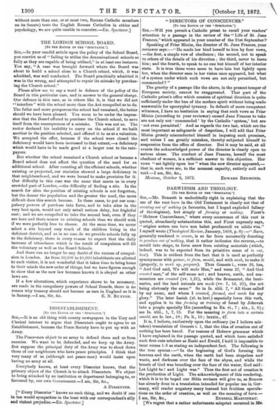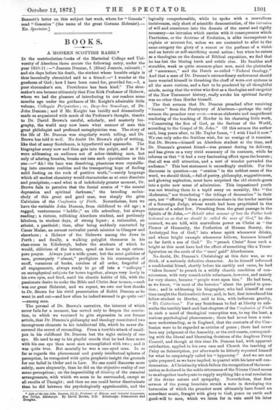DARWINISM AND THEOLOGY.
[To THE EDITOR OP THE "SPECTATOR.") SIR,—Mr. Bennett is undoubtedly right in explaining that the of the root bara in the Old Testament is clearly not that of creating out of nothing (a favourite, but I hoped exploded fallacy. of theologians), but simply of forming or making. Fiirat's- " Hebrew Concordance," where every occurrence of this root is- quoted, abundantly substantiates this, and Flint expressly says, " origine autem sua bara non habet producendi ex nihilo I myself wrote (Theological Review, January, 1868, p. 8) :—" Bara, generally rendered to create, is so far from necessarily denoting to produce out of nothing, that it rather indicates the reverse,—to- mould into shape, to form anew from existing materials (which, indeed, was to be expected from its primitive sense of to cut,, hew). This is evident from the fact that it is used as perfectly synonymous with yatsar, to form, mould, and with asah, to make it. (properly, to work up, prepare). Thus Genesis i., verse 26, has, "And God said, We will make Men," and verge 27, "And God created men," of the self-same act ; and heaven, earth, and sea- monsters are created (vv. 1,21), while the firmament, the lumi- naries, and the land animals are made (vv. 7, 16, 25), the act being obviously the same." So in Is. xliii. 7, "All those calla by my name, and whom I created, formed, and made for my- glory." The later Isaiah (xl. to lxvi.) especially loves this verb, and applies it to the forming or training of Israel by Jehovah into a people specially His (according to Ex. vi., 7; xix., 5, 6); see Is. xliii., 1, 7, 15. For the meaning to form into a certain. mould, see Is. lxv., 18; Ps. li., 10; lxxxix., 47.
It is, I believe, exclusively upon the ordinary (as I believe mis- taken) translation of Genesis i. 1, that the idea of creation out of nothing has been based. For reasons of Hebrew grammar which' I have explained in the passage quoted, and which have satisfied' such first-rate scholars as Rashi and Ewald, I hold it impossible to- treat verses 1-3 as stating an independent fact. The following is. the true syntax :—" In the beginning of God's forming the heavens and the earth, when the earth had been shapeless and waste, and darkness over the face of the abyss, and while the breath of God was brooding over the face of the water, God said:: Let Light be I and Light was." Thus the first act of creation is the production of Light. The acknowledgment of this rendering,. which it is to be hoped our Bible revisers will give us, as Bunsen has already done in a translation intended for popular use in Ger- many, will render nugatory many learned but fruitless specula- tions on the order of creation, as well on the meaning of bora.—
Bennett's letter on this subject last week, where for " Genesis " read " Gesenius " (the name of the great German Hebraist).— ED. Spectator.]



































 Previous page
Previous page